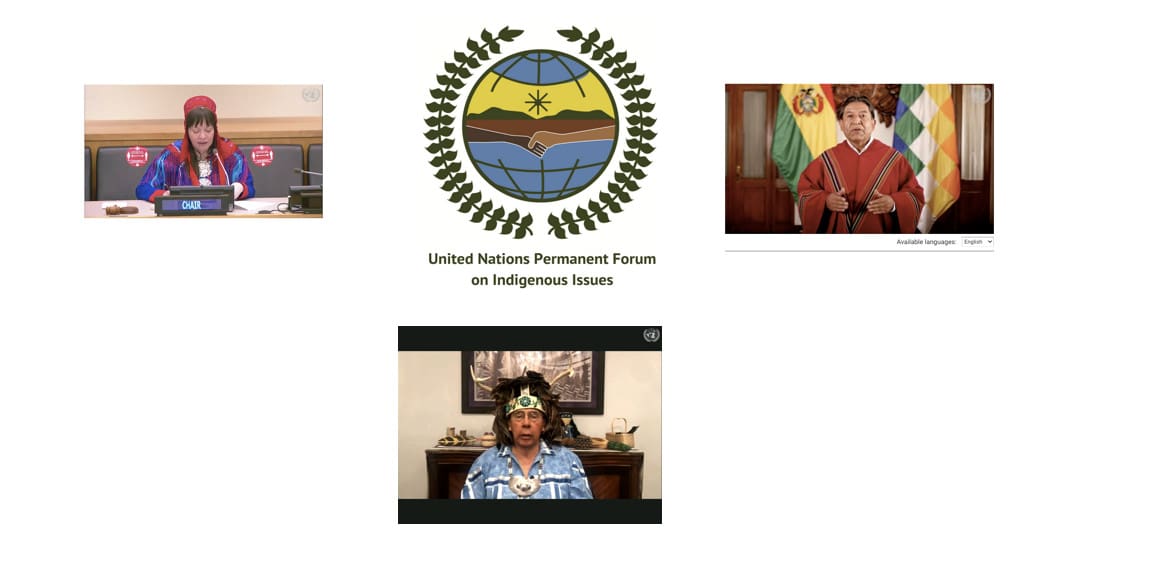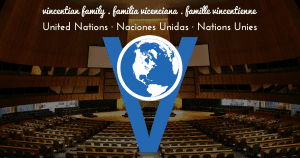The Forum was established in July 2000 to deal with indigenous issues related to economic and social development, culture, the environment, education and human rights. The forum raises awareness and promotes the integration and coordination of activities related to indigenous issues within the UN system; and also promotes respect for and full application of the provisions of the UN Declaration on the Rights of Indigenous Peoples (UNDRIP). The Declaration insists that “indigenous people have the right to maintain and strengthen their distinct political, legal, economic, social and cultural institutions, while retaining their right to participate fully, if they so choose, in the political, economic, social and cultural life of the State.” These rights must be protected and promoted.

The 20th session of the Indigenous Peoples Forum took place from April 19-30, 2021, with the theme: “Peace, justice and strong institutions: the role of indigenous peoples in implementing Sustainable Development Goal 16”, in light of the evolving COVID-19 situation. Goal 16 forms the basis for the attainment of many of the rights enshrined in the UN Declaration on the Rights of Indigenous Peoples, such as access to non-discriminatory and inclusive justice, recognition of indigenous institutions, the principle of free, prior and informed consent, and the right to land, territories and resources.
In his address during the Forum, Liu Zemin, the Under Secretary-General for Economic and Social Affairs, stated that the “impact of historical injustices, often without redress or reconciliation is a major reason for the continued marginalization of indigenous peoples. The lack of recognition of their identity and their existence challenges their ability to live in dignity and peace.”
The UN Secretary-General, Antonio Guterres called on the international community to ensure “equal and meaningful participation, full inclusion and empowerment of all indigenous peoples in decision making processes.” Their lack of participation in decision-making has meant, their specific needs are overlooked or ignored. He stressed the need to prioritize their inclusion in COVID-19 recovery efforts and sustainable development.
What we witness today is more of a violation of these rights than their protection. Indigenous lands are appropriated, exploited, and devastated everywhere for extractive industries and factory farming. The destruction of the Amazon region is an example. The COVID-19 pandemic, an unprecedented health, economic and social crisis has disproportionately impacted the indigenous peoples, who suffer from poverty, underlying health conditions and food insecurity. Compared to the general population, Indigenous peoples are three times more prone to fall into extreme poverty. They have greater rate of maternal and child mortality. The pandemic has severely impacted their livelihoods, education of children, access to healthcare and social protections. It has not only exposed the existing digital divide, the lack of internet connectivity made it impossible for indigenous communities to receive information as well as to participate in the Indigenous Peoples Forum virtually. Another instance of exclusion.
COVID-19 pandemic has created another pandemic – violence. More and more indigenous women and girls are facing domestic and sexual violence and discrimination. In North America, there is acronym – MMIWG – Murdered and Missing Indigenous Women and Girls. Indigenous women are killed with impunity in many parts of the world. The President of the General Assembly, Volkan Bozkir called on all stakeholders working to end gender-based violence and gender equality to engage Indigenous women who experience sexual and gender-based violence at a greater rate, and have limited access to education, employment and justice.
There is a sharp rise in violence against indigenous human rights and environmental defenders, and it is a major concern. At least 331 human rights defenders were killed in 2020, of whom two thirds were working on environmental and indigenous people’s rights. Most of these killings have happened in Columbia, Philippines, and Guatemala.
Since most governments failed to provide adequate healthcare and other basic services during the pandemic, indigenous peoples are forced to rely on their ancestral and traditional medicinal system to survive. Their traditional knowledge, resilience and solidarity have helped them to face the pandemic. Yet, there is a fear that indigenous peoples will be left out of the vaccine roll out. Mr. Volkan Bozkir has urged the global community to engage the indigenous peoples in the preparations for the next pandemic, for they are at a higher risk for infectious diseases, due to the destruction of ecosystems through deforestation, extractive industries and climate change. How this crisis and its ongoing social and economic consequences are addressed will serve as a litmus test for the pledge to leave no one behind.
The pandemic has forced the international community to pay closer attention to the indigenous peoples’ traditional knowledge practices related to indigenous food systems, biodiversity and climate change. Though climate change affects all ecosystems on earth, because of their high dependence on the ecosystems, indigenous peoples are disproportionately impacted by climate change. Forest fires, sea melt, desertification, ocean acidification and coral bleaching are depriving indigenous communities of their resources. As guardians of 80 percent of the world’s biodiversity, indigenous peoples can contribute to the global efforts to reduce greenhouse gas emissions and promote ecosystem-based carbon capture. They can also assist in the development of mitigation and adaptation initiatives. To take advantage of their knowledge, all stakeholders should encourage the participation indigenous peoples in the development of policies and initiatives at all levels – local, national, regional and global.
It is encouraging to see some of the measures taken or planned by the UN entities to implement the recommendations of the Permanent Forum. The Food and Agriculture Organization provides secretariat services to the Group of Friends of Indigenous Peoples and leads the Global Campaign for the Empowerment of Indigenous Women for Zero Hunger. The Office of the UN High Commissioner for Human Rights has stepped up its efforts to facilitate dialogue between indigenous peoples and State authorities, in light of the ‘persistent lack of indigenous peoples’ participation in decision making and increasing violence against indigenous human rights defenders worldwide.’
Decade of Indigenous Languages (2022 – 2032) – Participants from 50 countries, including government ministers, indigenous leaders, researchers, public and private partners and other stakeholders at the High-level event, “Making a decade action for indigenous languages” held in Mexico in February 2021 has issued a strategic roadmap for prioritizing the empowerment of indigenous language users. The current data indicates that at least 40% of the 7000 languages used worldwide are at some level of endangerment, especially indigenous languages. The Los Pinos Declaration adopted during the event, places indigenous peoples at the center of its recommendations under the slogan “Nothing for us without us.”
As a member of the Mining Working Group, the Vincentian Family NGOs are actively engaged in the Indigenous Peoples Forum at the UN annually, especially with REPAM (Red Eclesial Panamazonia), CIMI (Indigenous Missionary Council) and other Indigenous groups from the Amazon region. As part of the Forum, the Mining Working Group had organized two side events with these groups and had a dialogue session for better collaboration in voicing their concerns at the UN.
Teresa Kotturan SCN
NGO Representative at the UN
Sisters of Charity Federation








0 Comments